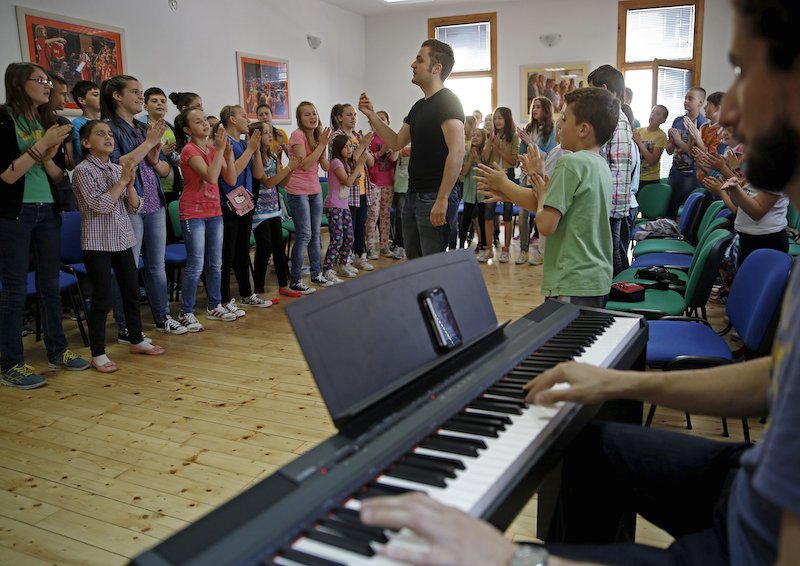
Members of the children’s choir “Superar” practice the songs that will be performed during the pope’s visit to Sarajevo at their music school in Srebrenica on May 23, 2015. Photo by Dado Ruvic courtesy of Reuters.
SREBRENICA, Bosnia (Reuters) — Even before arriving in Sarajevo, Pope Francis has achieved a remarkable feat.
Preparing for the visit, Bosnians of all faiths are showing a rare unity in a country plagued by political and ethnic tensions nearly 20 years after the end of its 1992-95 war that claimed over 100,000 lives.
While the pontiff’s June 6 visit is the most eagerly awaited by Catholic Croats, the smallest group in the ethnically segmented state, Orthodox Serbs and Muslim Bosniaks have also taken an active part in preparing a warm welcome for Francis.
His compassionate message seems to have struck a chord in a country struggling to overcome its divisions and advance its stalled bid to join the European Union.
“Citizens from all ethnic groups openly express joy about his visit,” said Tanja Topic, an analyst at the Friedrich Ebert Foundation in Banja Luka, capital of the Serb part of Bosnia.
“This certainly has to do with the pope’s messages about the need for peace, unity and tolerance that he has been sending since he was elected.”
In Srebrenica, where Bosnian Serbs slaughtered around 8,000 Bosniak men and boys in 1995, a 9-year-old Muslim girl said the same thing in fewer words.
“For me, the pope is a good man,” said Zejfa Ahmetovic, a member of a multiethnic choir rehearsing a song for the Argentine-born pope.
In the central town of Zavidovici, Bosniak woodcarver Salim Hajderovac, a devout Muslim, surprised his Catholic neighbours by offering to make a chair for the pope. The local Catholic priest and parish gladly agreed to co-finance it.
“I can’t tell you how much this means to me,” he said, showing the imposing chair of walnut wood engraved with the papal coat-of-arms and emblems of Bosnian Catholic shrines.
“The carvings show the religion and the size shows the pope’s great soul and heart,” he said in his small workshop.
“Politicians made us fight each other at the time (of war) but we, the common people, live together, work together, celebrate together and die together.”
Pope John Paul II visited Sarajevo soon after the war ended in 1997 to urge more dialogue between Bosnia’s three ethnic groups and religions, ignoring apparent assassination threats. He also visited the northern town of Banja Luka in 2003.
The children’s choir in Srebrenica, which in July will mark the 20th anniversary of the massacre that was Europe’s worst atrocity since World War II, will sing “Love people, love people.”
Last weekend, about 40 Serb and Bosniak children rehearsed the song in the town’s music school. “This is a chance for us to send a different message, our own message from Srebrenica,” said Serb student Ivana Stanojevic, 16.




